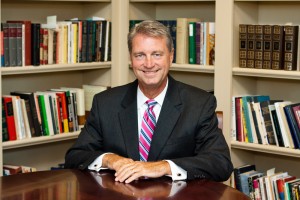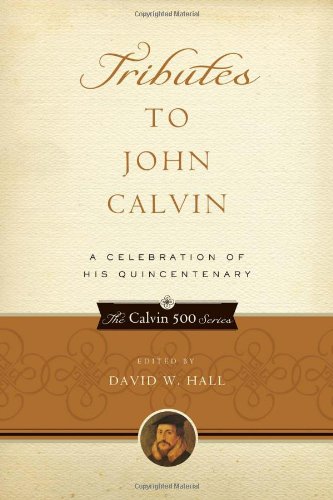Welcome again to Books At a Glance as we track out the Protestant Reformation and its influence in various areas. I’m Fred Zaspel, and Dr. David Hall joins us again today to talk about John Calvin and the Reformation of the Family.
David, welcome—great to have you back.
David Hall:
Thank you.
Zaspel:
What was Calvin’s view of marriage and how did his church seek to reform it?
Hall:
First of all, for evangelicals who have been around for a while like me, I like to speak of this as Calvin and the Focus on the Family 1.0. Many people are familiar with the groundbreaking work of Dr. James Dobson in the late 70s and early 80s on Focus on the Family. There was actually an earlier iteration of that, and one of the things that propelled that re-examination was the new-found prominence or rediscovered normal pattern of ministers being married. Of course, a thousand years prior to Calvin’s time, clergy were not married. But at the Reformation Melanchthon was married. In 1520 Luther married his Katrina; in 1525 in a very colorful, interesting story that Bob Gottfried and I call The Black Widow of the Reformation, John Oecolampadius actually married the widow of a friend, Martin Bucer, who had married the same woman, the widow of his friend, Wolfgang Capito. So, Widow Rosenblatt was sort of the black widow of the Reformation. And then Calvin was married in 1540 to Idelette, a widow in a Baptist tradition; and Theodore Beza was married in 1548. This was somewhat scandalous at the time, leading some to accuse Protestants of introducing promiscuity to the ministry. Of course, that’s not the case; they were actually finding marriage within the confines that God had designed it to be. But with celibacy overturned, Stephen Osmond, for example, has spoken of marriage and the family as the largest single institutional change brought about by the Protestant Reformation. We take that for granted.
There was a state of tracts and three things, I think, more than anything changed at the time of Calvin. The first was there was a shift away from viewing marriage as it had been before, and it was brought into the church. Typical Protestant liturgy, for example, following the Reformation would have been to have the wedding service as part of the Lord’s day service, at the end. Or when the congregation was gathered they would have a Lord’s day worship time and then they would proceed to the marriage and the taking of vows. If anybody’s like me and you’re the father of several daughters and you have to pay those outrageous bills, you would probably become a fan of that idea. But marriage was viewed as a change, as part of the life of the church, but secondly, and this is a tweak, a fine nuance, it was viewed as part of the church, but not part of the Roman Catholic curia. Roman Catholics had created a number of grounds for divorce and what they called impediments, which were different qualifications that had to be met or avoided in order to have a Christian marriage and Protestantism dramatically simplified those and brought things more in line to Scripture. And thirdly, with the marriage of clergy, all of a sudden family issues became much more prominent in the discourses, of sermons, of Bible studies, because the pastors who were preaching and teaching were now fathers of their own biological children as well as spiritual mentors. So, there were some decided changes at the Reformation.
There’s been some very interesting studies, some groundbreaking work, since the mid-1990s, I think, chiefly led by the recently deceased Prof. Robert Kingdon, who wrote a groundbreaking book that Harvard published in 1995, Adultery and Divorce in Calvin’s Geneva. The interesting thing, at least to me as a historian, is how this group, and there are others associated with it, is studying the actual consistory records or the city Council minutes of the time, to see what was going on in marriage in Calvin’s time. It’s very colorful and interesting information that shows us that there’s actually nothing new under the sun.
Zaspel:
What was Calvin’s understanding of the wife’s “submission” in marriage?
Hall:
Here again, I think maybe in a previous episode we mentioned Calvin’s sermons on Ephesians. I like to read some quotes out of context from Ephesians when I speak to groups from time to time to make the point that Calvin was a very compassionate, a very understanding man. His view submission was not that the husband was to be some kind of patriarchal ogre who would abuse his wife and lead her around. In fact, Calvin, and this was his phrase, called that monstrous. And in the sermons on Ephesians 5, that great rich passage on the role relationships of men and women in marriage, he says husbands ought to remember that if God has given you a wife, that is a person you will spend eternity with and you should treat her as such. So there’s a gentleness and there’s a respect in there, perhaps some of that came from his own experience as a married man. But his view of submission is clear, but it is always subject to obedience to God’s other revealed will.
Zaspel:
Where can we see some of his views on marriage and family?
Hall:
His sermons on Ephesians 5 is one of the gold mines, the textual study. Also, begin at the beginning; in his commentary on Genesis 1–2, he talks about the marriage bond as being foremost and being essential to the social life of human beings. He’s also got some extensive sermonic material on both Deuteronomy 5 and Deuteronomy 21 through 25, if you want to find those sermons. They’re a little difficult to find, but there on the web. And of course, in the New Testament his commentary on 1 Corinthians 6, and 1 Corinthians 7, those would be rich mines to drill down on for Calvin and marriage.
Zaspel:
We’re talking to Dr. David Hall about the various areas of impact of John Calvin. Next time Dr. Hall will talk to us about Calvin and the church. Thanks for listening in with us here at Books At a Glance.
Editor’s Note: Here are some related resources from Dr. David Hall
Tributes to John Calvin: A Celebration of His Quincentenary
wtsbooks
Amazon
Lectures on Integrity: A Review of Confessional Subscription as an Aid for Orthodoxy and Orthopraxy
Amazon
Post Tenebrae: Essays on Calvin and Calvinism
Amazon
The Genevan Reformation and the American Founding
Amazon
To Glorify and Enjoy God: A Commemoration of the 350th Anniversary of the Westminister Assembly (co-author with John L. Carson)
wtsbooks
Amazon
The Legacy of John Calvin (2008)
wtsbooks
Amazon
Calvin and Commerce: The Transforming Power of Calvinism in Market Economies (2009)
wtsbooks
Amazon
Preaching Like Calvin: Sermons from the 500th Anniversary Celebration (2010)
Amazon
Calvin in the Public Square: Liberal Democracies, Rights and Civil Liberties (2009)
wtsbooks
Amazon
Essays in Calvin and Calvinism (kindle editions, 2014-2015)
Volume 1
Volume 2
Volume 3
A Theological Guide to Calvin’s Institutes: Essays and Analysis (2008, 2015) (with Peter Lillback)
wtsbooks
Amazon
Calvin and Culture: Exploring a Worldview (2010) (with Marvin Padgett)
wtsbooks
Amazon

